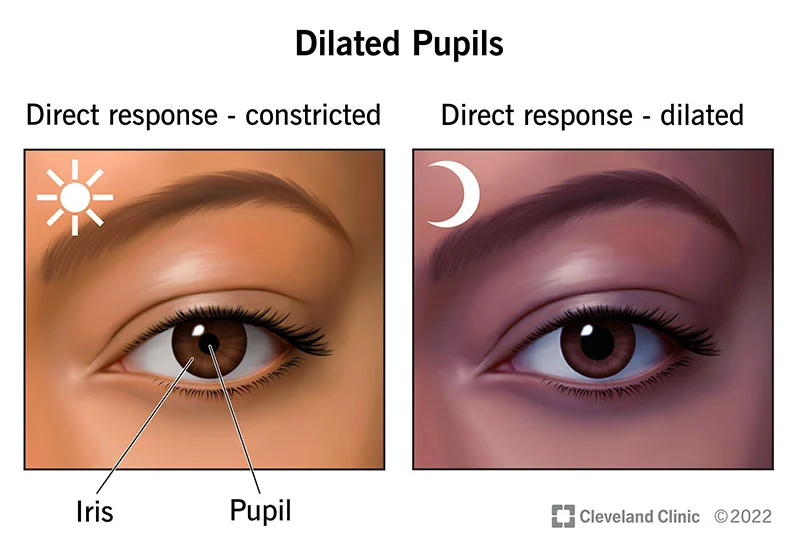When you go to your eye doctor for an eye health exam, they will often dilate your pupils as part of your regular wellness check.
Pupil dilation can show your doctor whether you have any problems with your eyes, like glaucoma.
If you go to the eye doctor, be sure to request a dilated eye exam if you have certain risk factors or family history.
What Is Eye Dilation?
A dilated eye exam involves the application of eye drops specially designed for dilating pupils. Dilating your pupils will allow more light inside your eyes. With eye dilation, your ophthalmologist can see into the back of your eye. More light enables your doctor to diagnose conditions better; that they could not otherwise see.
The eye drops keep your pupils dilated for the duration of the eye exam so that your ophthalmologist can thoroughly examine each eye. This exam lets them check for early stages of diseases, which can mean the difference between serious vision problems and a manageable condition.
How Does Your Doctor Perform a Dilated Eye Exam?
When your ophthalmologist or optometrist conducts a dilated eye exam, they will first administer eye drops to each eye. It takes about 15-30 minutes for your eyes to dilate fully after that. Once they do, your doctor may conduct the following tests:
- Pupil response test: Your doctor shines a small flashlight into each eye to see how your pupils react to the light.
- Eye muscle function test: The eye doctor asks you to keep your head still and follow a moving object, such as a pen, with only your eyes to test your eye muscle strength and response.
- Visual acuity test: While your eyes are dilated, your ophthalmologist will ask you to read letters up close and at a distance to check your vision.
- Visual field test: This test often involves a small flashing light on either side of your face that goes on and off. You tell the ophthalmologist when you see it come on, and where you see it, to test your peripheral vision.
- Tonometry test: A machine puffs air into your eye to test your eye pressure.
Do You Need to Have Your Eyes Dilated?
Whether you need to have your eyes dilated depends on your age, health, and risk of eye disease.
Your eye doctor will determine whether you need eye dilation based on the following criteria:
- Family history: If you have a family history of genetic eye disease or you already have eye problems, you need to have your eyes dilated so your ophthalmologist can look for and maintain those conditions.
- At-risk diseases: Some diseases, like diabetes, put you at a higher risk of eye problems.
- Vision trouble: If you visit the eye doctor for a problem with your vision, they may dilate your eyes to assess your vision thoroughly.
What Can Your Doctor Diagnose?
When your eyes are dilated, you should expect that your ophthalmologist will check your eyes for the early stages of eye disease so they can treat them early. They will look into your eye to assess your retina, optic nerve, blood vessels, and other parts they cannot see during an undilated eye exam. The dilation of pupils lets them look for these problems:
- Diabetes: Diabetes can lead to a range of eye problems, including diabetic retinopathy, glaucoma, and cataracts.
- High blood pressure: High blood pressure can cause your retina’s blood vessels to harden, leak, and hemorrhage.
- Macular degeneration: Your ophthalmologist will look for depigmentation, pigment clumping, and neovascularization, new blood vessel growth under your retina.
- Retinal detachment: Retinal detachment happens when your retina comes away from oxygen-supplying blood vessels. This condition is considered a medical emergency.
- Glaucoma: Glaucoma is a disease that damages the optic nerve when fluid builds up at the front of your eye.
How Long Does Eye Dilation Last?
The eye drops used for the exam can dilate your eyes for up to 24 hours. However, most people’s vision returns to normal within 4-6 hours.
According to the experts, it will take up to 30 minutes for your eyes to fully dilate, and brown eyes take longer than light-colored eyes to do so.
What Not To Do After Eye Dilation?
After your ophthalmologist administers the eye drops, you may notice:
- Blurry vision
- Difficulty focusing on close objects
- Light sensitivity
Use sunglasses until your pupils go back to normal to avoid pain from sensitivity. It may be unsafe for you to drive because of this sensitivity, and if you know you cannot drive, be sure to get a ride home from the ophthalmologist from a friend, family member, or cab.
You may also find it challenging to go back to work with blurry close vision and sensitivity to outdoor light.
Try to schedule your eye appointments so you can avoid these obligations. With dilation, pupil sensitivity varies, so while some people can continue their day as normal, others prefer to stay in dim lighting until they can see better.
How Often Should You Have It?
According to the experts, the frequency of eye dilation depends on your age and medical history. People with a history of eye health problems should get it done once a year or every other year.
Type 1 diabetics should have their exam within five years after their diabetes diagnosis. Type 2 diabetics should have theirs when they get diagnosed.
If you do not know when you should have your exam, get medical advice from your doctor. They can give you information specific to your situation.
Conclusion
Ophthalmologists and optometrists perform eye dilation to assess for risk factors and maintain optimal eye health.
Ask your doctor how often you should have your eyes dilated and what to expect when you do.


Leave a Reply